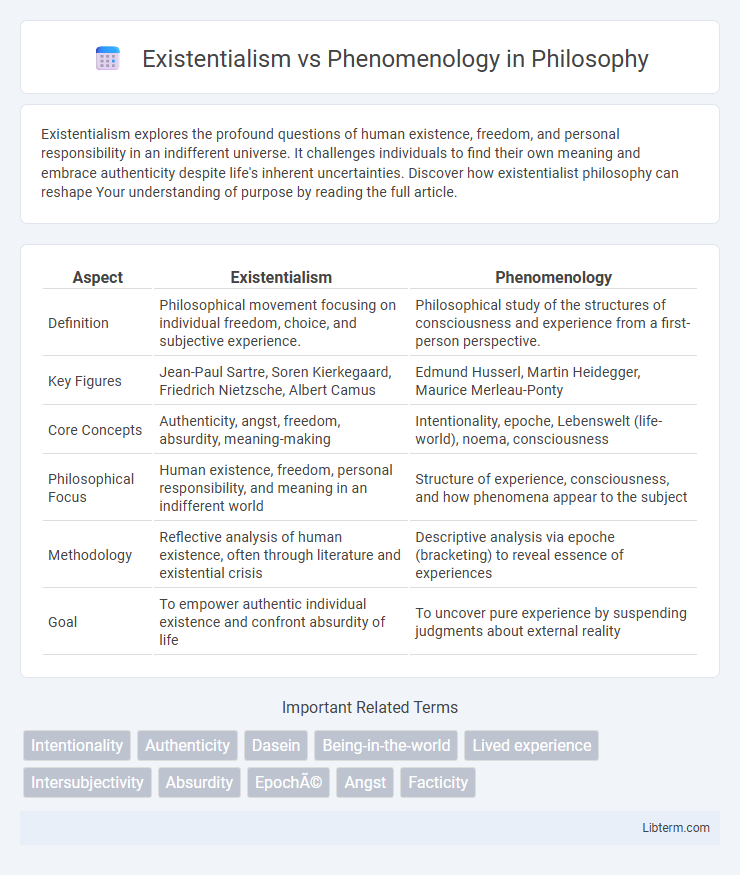Existentialism explores the profound questions of human existence, freedom, and personal responsibility in an indifferent universe. It challenges individuals to find their own meaning and embrace authenticity despite life's inherent uncertainties. Discover how existentialist philosophy can reshape Your understanding of purpose by reading the full article.
Table of Comparison
| Aspect | Existentialism | Phenomenology |
|---|---|---|
| Definition | Philosophical movement focusing on individual freedom, choice, and subjective experience. | Philosophical study of the structures of consciousness and experience from a first-person perspective. |
| Key Figures | Jean-Paul Sartre, Soren Kierkegaard, Friedrich Nietzsche, Albert Camus | Edmund Husserl, Martin Heidegger, Maurice Merleau-Ponty |
| Core Concepts | Authenticity, angst, freedom, absurdity, meaning-making | Intentionality, epoche, Lebenswelt (life-world), noema, consciousness |
| Philosophical Focus | Human existence, freedom, personal responsibility, and meaning in an indifferent world | Structure of experience, consciousness, and how phenomena appear to the subject |
| Methodology | Reflective analysis of human existence, often through literature and existential crisis | Descriptive analysis via epoche (bracketing) to reveal essence of experiences |
| Goal | To empower authentic individual existence and confront absurdity of life | To uncover pure experience by suspending judgments about external reality |
Introduction to Existentialism and Phenomenology
Existentialism centers on individual existence, freedom, and choice, emphasizing authentic experience and subjective meaning in an absurd world. Phenomenology, founded by Edmund Husserl, investigates the structures of consciousness and the ways phenomena appear to human experience, aiming to describe reality as it is perceived. Both philosophies intersect by exploring human experience but diverge in focusing on existential conditions versus the essence of consciousness.
Historical Origins and Influential Thinkers
Existentialism and Phenomenology both emerged in the late 19th and early 20th centuries, with phenomenology founded by Edmund Husserl, who emphasized the study of consciousness and lived experiences. Existentialism, influenced by thinkers such as Soren Kierkegaard and Friedrich Nietzsche, focused on individual existence, freedom, and subjective meaning. Key figures like Jean-Paul Sartre and Martin Heidegger further bridged these movements by exploring the structures of being and human existence within phenomenological frameworks.
Core Principles of Existentialism
Existentialism centers on individual freedom, authentic choice, and the inherent meaninglessness of life requiring personal creation of purpose. It emphasizes subjective experience, anxiety, and the rejection of universal essence before existence, highlighting human responsibility in defining one's own being. Key existentialists such as Jean-Paul Sartre and Soren Kierkegaard argue that individuals must confront absurdity and embrace freedom despite the inherent uncertainty.
Fundamental Concepts in Phenomenology
Phenomenology centers on the fundamental concept of intentionality, the idea that consciousness is always about something, emphasizing the direct examination of experience without preconceived notions. It investigates phenomena as they appear to consciousness through epoche, the suspension of judgment, allowing a clear view of essences and structures of lived experience. This contrasts with existentialism's focus on individual freedom, choice, and the subjective meaning of existence, while phenomenology provides a methodological framework for analyzing the core features of experience itself.
Human Existence: Subjectivity and Authenticity
Existentialism emphasizes human existence through subjectivity and the pursuit of authenticity, asserting that individuals create their essence through choices and living genuinely. Phenomenology examines human experience by exploring consciousness and intentionality, revealing how subjective perception shapes reality. Both philosophies prioritize individual experience but differ as existentialism focuses on freedom and authenticity, while phenomenology centers on the structures of experience.
Consciousness and Perception in Both Philosophies
Existentialism centers on individual consciousness as the foundation of authentic existence, emphasizing personal experience, freedom, and choice as essential to self-awareness. Phenomenology analyzes the structures of consciousness and subjective perception, aiming to describe how phenomena appear to the conscious mind without presuppositions. Both philosophies investigate consciousness, but existentialism prioritizes lived experience and meaning, while phenomenology focuses on the detailed description of perceptual processes and intentionality.
Freedom, Responsibility, and Meaning
Existentialism emphasizes individual freedom, asserting that humans are condemned to be free and must create their own meaning through authentic choices, with absolute responsibility for those choices. Phenomenology investigates the structures of consciousness and experience, revealing how meaning arises from intentional acts and situates freedom within the lived experience of being-in-the-world. Both philosophies converge on the interplay between subjective freedom and the responsibility to construct meaning, while phenomenology provides a method to analyze the foundational experiences underlying existential freedom.
Critiques and Debates Between Existentialists and Phenomenologists
Existentialists criticize phenomenology for its perceived abstraction and neglect of concrete human experience, emphasizing subjective freedom, choice, and angst as central to understanding existence. Phenomenologists argue that existentialism's focus on individual existence overlooks the foundational structures of consciousness and intentionality that shape experience. The debate hinges on whether human reality is primarily grasped through lived experience of existential conditions or through rigorous description of consciousness's essence.
Impact on Psychology, Literature, and Art
Existentialism and phenomenology profoundly influenced psychology by promoting individual experience and subjective reality, leading to humanistic therapeutic approaches emphasizing personal meaning and self-awareness. In literature, existentialism inspired themes of alienation, freedom, and authenticity, while phenomenology provided techniques for exploring consciousness and perception, enriching narrative depth. Art movements integrated existentialist concepts through expressions of angst and absurdity, whereas phenomenology encouraged detailed explorations of sensory experience and presence.
Conclusion: Synthesizing Existentialism and Phenomenology
Existentialism and phenomenology intersect in their commitment to exploring human experience, with existentialism emphasizing individual freedom, choice, and authenticity, while phenomenology focuses on the structured analysis of consciousness and intentionality. Synthesizing these philosophies reveals that understanding existence requires both the subjective authenticity championed by existentialism and the methodological rigor of phenomenological description. This integration enriches contemporary philosophy by offering a comprehensive framework that addresses the lived experience of being with both depth and existential meaning.
Existentialism Infographic

 libterm.com
libterm.com